Sunday Morning Chat: Pine Crest Manager Glen Pierson
Today we sit down with Pine Crest Manager Glen Pierson to discuss the challenges players face at the school, how their academics play into baseball and coaching his son….
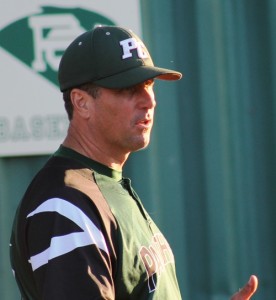 Anthony: Alright, lets start with where you coach and teach. Pine Crest is known as one of the more demanding academic high schools in Broward County. Talk a little bit about the challenge that creates as a coach.
Anthony: Alright, lets start with where you coach and teach. Pine Crest is known as one of the more demanding academic high schools in Broward County. Talk a little bit about the challenge that creates as a coach.
Coach Pierson: Well, as a coach, we basically get to have the kids that we have within our program. We’re not drawing a large crowd right now from outside sources because, quite frankly there are three things that it would really take to make a difference with an athlete.
One, they have to be able to be successful academically and the entrance exam is a good indicator of whether or not that student will do that. We have people apply all the time. In fact, our enrollment is up here for the school. But at the same time, a lot of our ball players here in the community aren’t that academically driven. One challenge is we get the players that we have and if the family is Gung ho and big on education, than they may apply at a school like Pine Crest; that’s number one.
Number two. There’s a pretty steep tuition that’s associated with going to this school. There are no scholarships. You either qualify because of financial need for assistance, or you don’t. Most families aren’t willing to pay what it would take to come to school here just for baseball.
And then [number three], you just hope that the other piece is there; those that meet the academic standards and those who have the financial means to be here will also contribute on the ball field. So those are our three big obstacles initially. Then once we have them in the school, the academic drain is intense. I myself am a chemistry teacher. I teach honors chemistry. It’s really comparable to a first year college level course that sophomores are taking, just to give you a little perspective. And these students have a tremendous amount of work just to do for that class. Now they’ve got seven classes similar to this. It’s tough, it’s very tough. The academic grind is challenging but at the end we also know its worth it because our kids are extremely well prepared for the next level. Whether that be college with baseball or college without. They’re ready for the academic rigors of a college education.
Anthony: Talk a little bit about those challenges that the players face. Give me some specific examples of things maybe that they have to face here, that baseball players at some of the public schools or even some of the other private schools don’t have to face on a daily basis.
Coach Pierson: Ok, we start our academic day a few minutes after 8:00 and we end at almost 3:40. So our academic day is longer right away. The number of hours that the kids are in school is longer. I’m going to guess our practice times are very comparable to the others but when our kids are done, they average around three hours of school work when they get home. I know this first-hand because my son went to school here. So I know what his experience was and when he came home from school, he went in and did his work. He was very successful as are all of our kids. One hundred percent of our kids go on to college from here.
But as a ball player you’re fitting in several hours of some athletic rigors and you go home and, you know, you know every single day, that you have those extra three hours. Now, you may have a school day where you have two or three tests during the day. And again, these are very challenging tests. They’re not memorization evaluations; they are tough critical thinking evaluations and they really tax the mental capacity, they challenge these kids. And again, we are getting them ready for the next level.
So our kids come out to a practice or a game and they’re mentally already tired. What we try to do is, just the way we try to get their athletic conditioning up, we want their mental conditioning up. It’s easier when we have a kid that’s gone through the lower school and the middle school here because they’re used to the rigors. Even in the lower school they’re doing a lot of work after school. That doesn’t mean that a kid can’t come in and do the work and be successful in high school. It just means that they have to understand that there is that added pressure of the academics. And I’ll throw one more thing out there; we’ll have an afternoon game today so our day will be a little longer than a typical practice, it doesn’t change anything. If we have a night game, it doesn’t change anything. If we get done at 10PM, they still have their school work to do, and then that’s displaced by the later schedule. So maybe they’re getting their work done between 10:30 and 1:00 but they still have to do it.
Anthony: Your teams are known for being pretty fundamentally sound and relatively smart ball players. How much of the training they get on the academic side and all of that mental stress; how much do you think that helps them on the baseball field?
Coach Pierson: I think it helps a lot. They know that this is a thinking man’s game. A game that involves a great deal of mental preparation and thought in the act. We know we have a fighting chance with this group of kids to be successful in a game when we need them to be mentally at their best. We need them to know that this situation mandates this result. And we need you here, or we need you to do this and this is how you do it. And we know that is an advantage for us. They have that capacity to cope with all the things that happen in games. And when it doesn’t go exactly as you had planned, how you adjust to that as well; and we’re good with that as well.
Anthony: Last question on this subject. How hard is it for you as a coach and balance the commitment you expect on the field, but still allow your players to meet their demands in the classroom?
Coach Pierson: Well it’s a lot easier for me now after the number of years I’ve been here. I’ve been at this school for 19 years so I fully understand. And I will tell you; I even became more empathetic when my son was going through this. So when a student athlete or ball player comes up to me and says, “Hey coach I’m going to be a few minutes late. I’m going to extra help; my math teacher (or my English teacher) has extra help after school.” We don’t even bat an eye anymore about that. We know that that’s a part of the process and we support it 100%. Just yesterday we were preparing for our game today and one of our pitchers for today had extra help and so we just reversed how they were going to work on the field, and put them in their situations preparing for today. But again, that’s part of it. Adjusting.
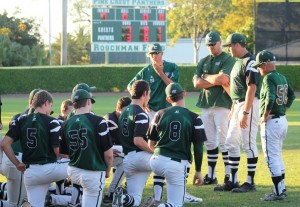 Anthony: Moving on to you personally, you just mentioned you’re closing in on two decades as manager here at Pine Crest. Up until recently you were a bit under the radar when it came to coaches in Broward. Why do you think that is?
Anthony: Moving on to you personally, you just mentioned you’re closing in on two decades as manager here at Pine Crest. Up until recently you were a bit under the radar when it came to coaches in Broward. Why do you think that is?
Coach Pierson: Well, I’m not the person who’s out there with a lot of tournament baseball I’m not attending a lot of conferences. I imagined a good portion of this is, I’m also not even originally from this area and a lot of these people know each other. Now you would figure after 19 years maybe that would’ve increased. I think it has improved in some ways, but at the same time I don’t necessarily blame others; I’m not out there putting myself in places where I’m spending a lot of time with other coaches. Most of my interaction with other coaches has been either from the game experience or possibly through, I guess my son, and what he was able to accomplish when he was involved in tournaments. I’m going to say that’s probably what it is. I wouldn’t think there’s more to it than that.
Anthony: One of the fun things for us is bringing the coaches like you out in the open for others to see. There are so many great coaches in South Florida that go unrecognized and we’ve, through the All Star game and some other events have tried to bring awareness to that. One of the things we’ve considered is holding a couple of Coaches Conferences a year, for coaches to bounce ideas off of each other. But knowing the competitive nature of coaches and how guarded they are in what they know on the game, we are weary the coaches would be up for that. Good idea or bad idea?
Coach Pierson: Well I think you’ve addressed both sides of it. I think the potential to have stronger relationships within the community, with the coaching community, or being able to possibly bring about unified decisions and change that could improve baseball either statewide, countywide or whatever. I think that would be a good thing, I certainly do.
At the same time I agree 100% with what you’re saying. We tend to be a little guarded with what we will get out there and what we’ll say. So how open people will be, I’m not sure, but I think I can see some positives in that happening.
Anthony: Your district is one of the most competitive in the state. Some coaches would prefer to play in an easy district just to make it to the playoffs every year, and others like to play as many big district games as possible during the season. Which side of the debate are you on?
Coach Pierson: I can’t remember the last time we had a district that we were part of here at Pine Crest that was an easy ride into regional play. And quite frankly, I am on the side that embraces having an extremely tough district. I don’t quite understand how our comparable size district in Miami has three teams and we have seven; I don’t understand that. But the same time, I really like the seven teams that are in our district and it gives us 12 excellent games every season. I’d much rather have that than having teams to play, that you’re mandated play that really are not going to help your organization your players get better or better prepare for regionals.
Anthony: When I was playing, rivalries were a big part of the game. How much are those rivalries hurt by the fact that the state every two years changes the districts?
Coach Pierson: With us, I don’t think there’s been so much change that we’ve lost that many rivalries. The one rivalry I guess you could say that we sort of lost the Pompano rivalry; which we, through the Game of the Week, were able to reestablish this season. But we really only went two years without playing so it wasn’t lost that long. And as changes happen, we’ve been lucky, our rivalries are still there. I can see how other districts would be a little less receptive to these changes every two years but for us, it really hasn’t hurt any of the rivalries I’ve really grown to appreciate through these years.
Anthony: In your time you’ve seen some really great programs at the top. Various times different programs have been at the top in the county winning State Titles. Give me the one program that stands out at the height of their run as what you would consider the most dominant while they were on top.
Coach Pierson: Most dominant…well they’re not in our district anymore, but when they were competing, American Heritage really was…they were a terrific program; they still are a terrific program. I don’t really know much about their players at this point. We used to have great games with them too. Our first time beating them was a huge moment for our program, because we always knew that they were a top tier baseball program. So I’d have to give them a little shout out for that.
Anthony: You had a chance a few years ago to coach your son, you mentioned that. I just spoke to Ray Evans; he’s looking forward to doing that and several other coaches have experienced that feeling. Can you describe that feeling of coaching your son?
Coach Pierson: Maybe one of the most rewarding things that I have every done. We both love baseball and I got a chance to continue my instruction with him not just as little tyke, but all the way through Little League, middle school and then high school. And I don’t think there’s many more things that have been more rewarding than that experience. At the same time, you can imagine there’s always a little more of an emotional attachment to success and failure and I was much better at managing those emotions his senior year than, let’s say, earlier on so as with all things, we hope to improve at it.
And that might’ve been a little tougher on Michael than it was for me because obviously, as his superior, I guess, the leader, I had that advantage. But he really handled it well and it made me a better person also. A little added pressure in terms of coaching my own son because at the same time I knew he was a top prospect and a top high school baseball player, I always felt like I had to have him back it up every time he took the field.
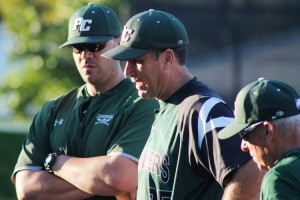 I didn’t want people necessarily say he’s playing Daddy Ball. Because that idea of Daddy Ball, that’s a tough label to cope with and I didn’t want it to be affiliated with me or Pine Crest baseball. And fortunately for me, my son backed it up with good play. I wouldn’t have traded it for anything and some of my fondest memories were watching him either deal with adversity or just be exceptionally successful on the field and watching the smile as he would come around the base path or get a clutch out. I mentioned American Heritage; one of our biggest wins was his senior year. He stuck out the sides in the last inning. They had six home runs in this game and we beat this team. They might have had eight home runs in the game. But he came in, in the last inning and struck them out, finishing up with one of the top hitters in the county. That offensively was a rough day for my son and his big moment came there at the end. I just remember him coming off the field and just feeling, not just great pride for beating that program, but also for him, personally knowing that we made something pretty special happen there.
I didn’t want people necessarily say he’s playing Daddy Ball. Because that idea of Daddy Ball, that’s a tough label to cope with and I didn’t want it to be affiliated with me or Pine Crest baseball. And fortunately for me, my son backed it up with good play. I wouldn’t have traded it for anything and some of my fondest memories were watching him either deal with adversity or just be exceptionally successful on the field and watching the smile as he would come around the base path or get a clutch out. I mentioned American Heritage; one of our biggest wins was his senior year. He stuck out the sides in the last inning. They had six home runs in this game and we beat this team. They might have had eight home runs in the game. But he came in, in the last inning and struck them out, finishing up with one of the top hitters in the county. That offensively was a rough day for my son and his big moment came there at the end. I just remember him coming off the field and just feeling, not just great pride for beating that program, but also for him, personally knowing that we made something pretty special happen there.
Anthony: Was there ever a point after he graduated that you thought about walking away from coaching?
Coach Pierson: Well I’ve been asked that quite a few times and I always start by saying that really, Michael was in the Varsity program consistently from his sophomore year on. So out of 19 years of coaching ball I was his head coach for three seasons. Which means 16 other seasons I wasn’t. And so the long answer to this question is, I love the game; I love being able to work with athletes; especially I love working with them here. Really that wasn’t a condition of me working here. It worked out that he ended up being a ballplayer. But I really enjoyed the years before him and I very much so enjoyed the years after. That’s what I’ve heard from other coaches, but that’s really not the case for me.
Anthony: Moving to on the field. What’s the biggest pet peeve of yours as a coach on the baseball field?
Coach Pierson: Pet peeves, can I think here a second..
Anthony: Sure…take your time…
Coach Pierson: I’ve got an answer here. My biggest pet peeve would be seeing talent lose sight of team goals from time to time. We understand in that…I myself am guilty of logging in individual statistics after every game. And it’s easy for people to get wrapped up in numbers, but there’s really one number that means the most to me and that is: the win column in a game. And while I want each individual player to be successful and I would love for them all to have 400 batting averages; 98% fielding percentages and great ERAs, I understand that’s just not going to happen. So when we start losing sight of that, and we put personal interests ahead of team goals, and personal attitudes ahead of team goals, it tends to put me in a place that tests my control of the situation because I really don’t like that.
Anthony: You mentioned a little bit before about this, but over your career which would you say was, or is, Pine Crest’s biggest baseball rivalry and why?
Coach Pierson: I have to pick one, huh? One rivalry…well I guess…two of the teams who have been in this district regardless of change has been Charter and North Broward Prep. And I’ve got to pick one so…Wow…
Anthony: Are they equal?
Coach Pierson: They have been through the years some pretty good rivalries and quite frankly in all sports at this school. If I’d be permitted to say those two I would be grateful.
Anthony: Your team this season is currently tied for second in the district. How is it that year after year the players change but you’re able to keep the team battling for district titles?
Coach Pierson: Well I’m very blessed to have some incredible assistant coaches that have supported what would be my philosophy or Pine Crest’s philosophy for baseball. Prior to this current staff, some excellent coaches, the two coaches that are newer to our program within the last four so years, my pitching coach Nick Manganero, my hitting coach Ryan Shealy both with professional baseball experience. They have been incredible in helping take our game to what I consider is the next level.
Prior to that I guess people would say that our philosophy and our work ethic, my work ethic, would be one of the driving forces towards that success but I know it takes a lot more than just one person. I also have another coach that I feel compelled to address; Larry Kashdin has been with me for nine years, and he’s really helped me through those years and help this program grow tremendously. And so the four of us along with our JV and middle school coaching programs, they really have helped make a huge difference.
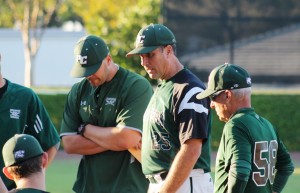 Another factor that I want to address is that we are committed to training our middle school kids. Our sixth, seventh, and either graders have basically the same philosophy that we teach at the high school level. So they get a very early dose of a very advanced stage of baseball. We know that they can’t necessarily do everything with that ability level, but their mental process, their familiarity with the system, starts at a very young age. And in the last decade, I’ve been more and more committed to making sure that our coaching staff myself included, were all working with these young kids and bringing that system through. And so that has been a big, big help. The coaching staff and the fact that our younger kids get this advance what we would consider pretty advanced system of baseball at a very young age.
Another factor that I want to address is that we are committed to training our middle school kids. Our sixth, seventh, and either graders have basically the same philosophy that we teach at the high school level. So they get a very early dose of a very advanced stage of baseball. We know that they can’t necessarily do everything with that ability level, but their mental process, their familiarity with the system, starts at a very young age. And in the last decade, I’ve been more and more committed to making sure that our coaching staff myself included, were all working with these young kids and bringing that system through. And so that has been a big, big help. The coaching staff and the fact that our younger kids get this advance what we would consider pretty advanced system of baseball at a very young age.
Anthony: How much of that helps? I know Heritage does that and I know, some of the other schools do that; from sixth grade all the way up. Even some of the public coaches have started to realize they have to get out into their community and start the system even a little bit earlier than ninth grade. So how important is that as a coach to start it at that age and develop it all the way up?
Coach Pierson: I think it’s critical and I’ve got a couple of examples to share with you. We had a group of guys that I helped coach through travel ball and tournament ball when they were much, much younger. One of them was Ben Arkin and another one, my son. We had a lot of these kids that were Pine Crest kids. And so, even before middle school, we were working when they were seven, eight years old and they were playing in travel ball tournaments together. So we saw how our success started to improve when we have our guys come through our system. We have our sister school, Pine Crest, Boca facility; which we want those kids to come here and we want our system in that particular environment as well. We’ve been able to get our system instilled in a lot of their play in their system up there so when they come here we’re seeing that they’re more prepared for what we’re doing. And as a result going back to what you said, you to talk about how we have been in the running in the competitive spirit of our district, we’ve been there every year, that’s proof to me that getting them young is very, very important. And they are really our only source of consistent baseball people coming to this school.
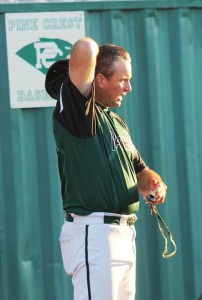 Anthony: Alright; lets finish with a game, I’ll give you some choices and you pick one or the other.
Anthony: Alright; lets finish with a game, I’ll give you some choices and you pick one or the other.
Coach Pierson: OK.
Anthony: Boxing or MMA
Coach Pierson: I’m not a fan of either, so if I have to pick, I’ll go with boxing.
Anthony: Nike or Reebok?
Coach Pierson: Ha! Nike.
Anthony: Sunflower seeds or peanuts?
Coach Pierson: Peanuts.
Anthony: A walk off homerun or a walk off squeeze?
Coach Pierson: I’ve had a chance to enjoy both…I’m going to say, the execution of a squeeze. It’s something that’s thought out, it’s planned. The other is sometimes just luck and I’ll take the squeeze.
Anthony: DH or no DH?
Coach Pierson: In high school I’m going to go with the DH.
Anthony: How about at the major league level?
Coach Pierson: I’m a National League guy.
Anthony: Rock ‘n Roll or Country?
Coach Pierson: I’m going to go, Rock ‘n Roll.
Anthony: A diving catch in the outfield or an outfield assist?
Coach Pierson: I love the assist.
Anthony: Alex Rodriguez or Ken Griffey Jr.?
Coach Pierson: Ken Griffey Jr.
Anthony: Here’s the lighthearted one, cake or ice cream?
Coach Pierson: [laughing] Sweet tooth, I’ve got a huge one! I’ll go with ice cream.
Anthony: Alright, last one. A state title and then end your coaching career this season, or no state title and 10 more years of coaching.
Coach Pierson: Wow! You’re putting it out there. I’ve dreamed of getting a title and that’s a tough mix but the title would be pretty special. So I’ll take the title.
Anthony: Alright, thank you.










Great guy, Great coach, Great teacher. Cant get any better then Coach pierson.